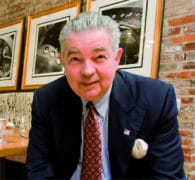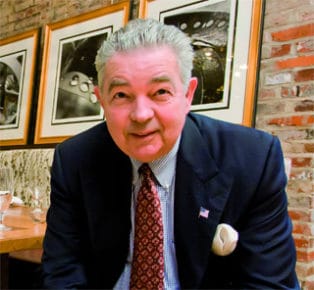
David Smith‘s swan song as head of Sinclair Broadcast Group is a tad warbly.
But, rest assured, his legacy as the man who built this Baltimore-based company into the largest owner of TV stations in the U.S. will be remembered by all.
Smith stepped down as Chairman/CEO at the end of January, and now holds the title of Executive Chairman. Succeeding Smith in his previous role is former CFO Chris Ripley, while SVP/Corporate Finance and Treasurer Lucy Rutishauser moves into the CFO role.
Presiding over first quarterly earnings call without his CEO stripes, Smith revealed what appears to be positives: Sinclair’s revenue and net income both increased.
Alas, the owner of 173 television stations in 81 markets missed Wall Street’s estimates as it also declared an 18-cent quarterly cash dividend to Class A and Class B shareholders of record as of March 1. The dividend is payable on March 15.
Fueled by media revenues, Sinclair’s Q4 total revenue grew to $797.7 million, from $611.8 million. Although total operating expenses soared to $564.25 million, from $487.55 million, operating income grew to $233.45 million, from $124.25 million.
The result: Net income attributable to Sinclair catapulted to $120.9 million ($1.32 per diluted share), from $58.2 million (61 cents).
Analysts polled by FactSet anticipated EPS per diluted share of $1.36. Meanwhile, revenue of $797.7 million missed their consensus estimates of $809 million.
“Hopefully you share your excitement as we move forward to the future of broadcast television,” Smith told analysts on his company’s Q4 and FY16 conference call on Wednesday morning before yielding to Rutishauser.
For full-year 2016, total revenue climbed to $2.74 billion, from $2.22 billion. Net income increased to $245.3 million ($2.60 per diluted share), from $171.5 million ($1.79). Why the gap? Media production expenses soared to $953.09 million, from $733.2 million.
In prepared comments distributed prior to the call, Smith said, “With the spectrum auction coming to an end and the potential for deregulation on the horizon, we expect 2017 to be a pivotal year for Sinclair and the broadcast industry.”
Additionally, the FCC’s Notice of Proposed Rulemaking for the voluntary use of ATSC 3.0 is expected to boost business opportunities, products and services while it also anticipates “the long-awaited deregulation of the industry’s antiquated rules and the end of the spectrum quiet period to spur consolidation; a positive given that our industry has been prohibited from competing on a level playing field with other forms of media.”
Furthermore, Ripley said, “2017 is off to a productive start with the launch of two emerging multicast networks, TBD and CHARGE!, which join our already successful multicast network, COMET,” while increased distribution is expected for pay-TV network The Tennis Channel, which Sinclair acquired in March 2016.
Looking ahead to Q1 2017, media revenue, before barter, is expected to be approximately $602.0 million to $606.7 million, up 13% to 14% year-over-year.
For FY 2017, Barter and trade revenue is expected to be approximately $116 million.
The company did not note or break out revenue estimates for its two AM and two FM radio stations in Seattle, inherited from its August 2013 $373.3 million acquisition of Fisher Communications.
Sinclair is also the parent company of Dielectric, which manufacturers products that equip television and radio broadcasters with antenna and signal-transmission solutions, and Acrodyne, which provides service and support for broadcast transmitters throughout the world.
— Adam R Jacobson, in Fort Lauderdale
RBR + TVBR RELATED READ: https://rbr.com/sinclair-spectrum-auction/




